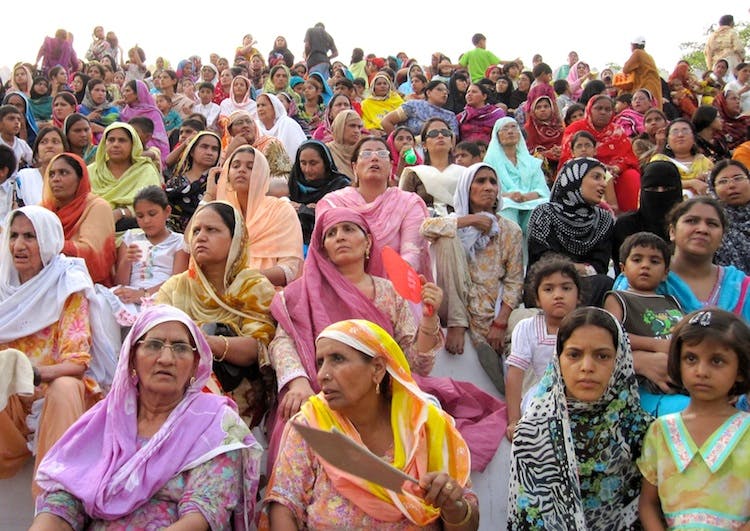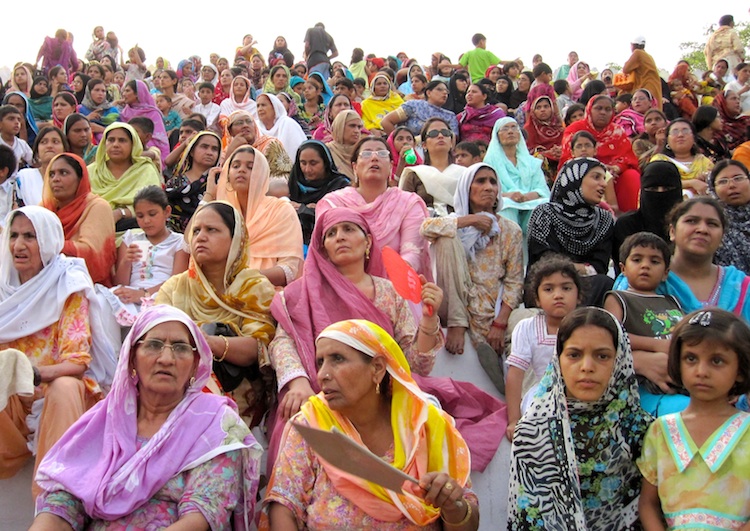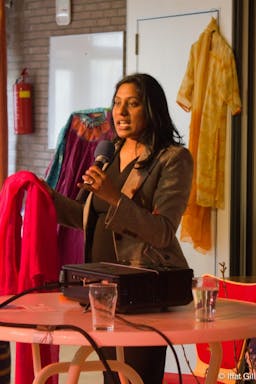Can legal reforms protect women in Pakistan?
Jan 21, 2015
Story


As Pakistan is moving towards being an economically sound country, the situation for the 52 percent of the country’s population which compromises of women is not catching up with the speed. One of the recent improvement efforts is the introduction of Domestic Violence (Prevention and Protection) Bill 2009, the first legislative step of its kind in the history of the country, which covers effective legal measures, civil remedies and compensatory provisions for the aggrieved persons. Stories like that of 17-year-old Mafia Bibi from Sahiwal city keep plunging us back into the dark realities of where our society actually stands today. Mafia’s brother brutally chopped off her head, ears and nose in the name of ‘honour.’ According to the local newspaper, Mafia had allegedly eloped with the man she loved. The family hunted the couple down and brought them back. It was decided that the two would be married off but in the meantime her brother indulged in the cold-blooded act. Many cases of this nature go un-reported. In most reported cases, like that of Mafia’s, the police and the judiciary manage to develop a soft spot in their hearts for the abuser, as the victims are thought to have provoked the abuser to do this. Women are confined to the house, which is considered to be the safest place for them. The same home has the potential to become the deadliest place to be, if as a woman she fails to comply with the archaic social and cultural norms.
Honour killing is an extreme form of domestic violence, executed by male family members when they feel that the woman has stepped out of the moral boundaries and freedom allotted to her. Honour, in this case is always related to the actions of the women. People go to extremes in order to ‘preserve’ the family honour. According to Human Rights Commission of Pakistan (HRCP), 647 out of the 1404 women murdered were honour killings in the year 2009. In the sub-continent culture, it is of utmost importance that the female sexuality remains under the control of men. A woman challenges the inherent superiority of the males in her family when she chooses her own marriage partner. This is an act that does not go un-punished. Punishment becomes a necessity so that other women do not follow the same footsteps. The family honour is traditionally associated with the nose in the sub-continent region’s local traditions. An old proverb implies ‘cutting the nose’ with bringing shame to the family by one’s actions. This is why punishment for women in most cases has been the age-old ritual of literally cutting off the nose of the victim as seen in Mafia’s case.
Any reason like alleged adultery, premarital relationships (with or without sexual relations), rape, falling in love with a person of whom the family disapproves and sometimes even mere friendship with someone from opposite sex, can all be reason enough to trigger aggression. This mindset is so evasive that people hardly realize how it has enslaved them.
The issue of killings in the name of honour began to appear on the political agenda in Pakistan in 1999 as a result of growing pressure from the civil society and UN agencies including UNICEF. During the National Convention on Human Rights and Human Dignity, held in April 2000, Former President of Pakistan, General Pervez Musharraf announced that such killings would be treated as murder. Today, even though these killings continue, steps are taken to combat the situation through introduction of basic institutional reforms after the strong condemnation by the government.
In a key move to check domestic violence against women and children, the National Assembly, in August 2009 passed a private bill to prevent the abuse through quick criminal trials and a chain of protection committees. The DV (Domestic Violence) Bill addresses domestic violence, which is not limited to “all intentional acts of gender based or other physical or psychological abuse committed by an accused against women, children or other vulnerable persons, with whom the accused is or has been in a domestic relationship.”
In a twitter interview, Special Public Prosecutor Nighat Dad said that as soon as the Bill made it through the passage of National Assembly, the Council of Islamic Ideology intervened. The Council termed the bill as discriminatory and issued a statement criticizing the bill on the grounds that it “would fan unending family feuds & push up divorce rates.” The Council was worried about giving a greater role to the police in family affairs, and warned that it would encourage corruption and bribery while the police would trample the sanctity of home. The Bill was to be passed by the Senate within the stipulated 90 days but after the opposition from Council, the government unfortunately gave in and allowed the DV Bill to lapse. As women rights organizations urge the government to submit the Bill, Ms. Dad called the situation hopeless. “The government’s attitude towards pushing for the cause has been hopeless ever since the Council of Islamic Ideology’s opposition,” she said.
One of the most notable sections in the DV Bill is (9) about the compensatory provisions for the victims. The first breach of a protection order will be punishable with imprisonment of up to one year but not less than six months and a minimum fine of Rupees 100,000 that will be paid to the aggrieved person. This is completely unheard of in Pakistani culture, where the woman family member might receive monetary relief for what she has been through if she survives. The male is the head of the family and the financial control thus remains with him, be it the brother, father or husband. This makes the reform unfeasibly groundbreaking, since the whole family traditions revolve around keeping the woman deprived of any independent financial resources.
Concerns have also been expressed by civil society about the lack of cooperation from the Police. Last February, HRCP called upon the Government of Punjab to ensure an early and transparent investigation into an alleged honour-killing incident of Saima Bibi, a young woman from Bahawalpur District. She had eloped with a man named Dilawar to Karachi in November last year. She was soon brought back to her family’s house after an assurance that she would be married off to Dilawar and not to someone of the family’s choice. That did not happen though. She was confined to the house for the next two months and died of unexplained circumstances on January 22, 2010. Even though the family maintains that it was a suicide case, there were visible marks of torture on her body in the post mortem report. The tragic story of Saima’s does highlight the role of Police as they showed least interest in registering the case, and according to HRCP officials, ‘were pampering the accused.’
According to US Department of state report, women who tried to report abuse faced serious challenges. Police and judges were reluctant to take action in domestic violence cases, viewing them as family problems. Efforts in reporting such cases resulted in the Police encouraging the parties to reconcile. Reluctance in pursuing charges also exists among women because of the stigma attached to divorce. For Pakistani women, an independent life without their families is un-imaginable. Without family, you are nothing, and have nothing in everyday life. That is one of the reasons why sometimes, reforms like the DV Bill are not welcomed by women themselves in oppressive societies.
The judges, especially those in lower courts, have also been known to show bias towards the women who approach the legal system for help. According to a report from Asian Human Rights Commission, violence against women is seen to be of no importance to the judiciary of Pakistan, particularly the lower judiciary. The Domestic Violence Bill does address the issue and directs the courts to provide relief directly to the applicant in their jurisdiction: “An aggrieved person or any other person authorized by the aggrieved person in writing in this behalf, may present an application to the Court within whose jurisdiction offence was committed for seeking any relief under this act.” This option does reduce the necessity of reporting incidences of violence to Police due to stigma attached to it. It is stated that the court shall fix the hearing within three days of the receipt of the application, which shall be disposed of within a period of thirty days. Pakistan’s court system is known to be slow and burdensome, and people have to wait for months until they get a date for hearing. It could take years for the court to reach a decision. The proposed legislation also directs courts to direct the accused to undergo ‘mandatory counseling with an appropriate service provider.’ This is also unheard of in the country, as there is no concept of counseling and is simply unaffordable.
However, the biggest challenge for these reforms is not just the stance of the clerics who fear that these legal interventions will put the sanctity of family system into jeopardy. Another challenge is the overall mindset of women who feel that these reforms will not have an impact on the lives of the women any time soon, unless institutions and behaviours of the Pakistani society become more gender-sensitive. “A common woman’s life in this country has not been affected with the introduction of this legislation. It has had very minimal impact on their lives, if any as it is not in their culture to report their own fathers, brothers or husbands,” says Ambreen Laila, a public sector NGO consultant. “A major portion of the population of women does not realize the rights violations they are going through. Women in our region (sub-continent) feel insulted if their violent or abusive husband is insulted in any way by anyone else. Their honour and respect lies in that of their husband’s,” she adds.
The women of Pakistan believe that it is their destiny to bear the consequences of being born into a patriarchal society as a female. Most married women consider abuse a daily routine, like every day house chores. The whole culture seems to revolve around preserving the family honour, which is why honour killing is deemed ‘heroic.’ Compliance to the cultural norms is part of the female’s upbringing both at home and at educational institutions, which is justified by unquestionable religious and cultural rationale. A domestic violence survivor from Khanewal, Tehmina James thinks otherwise. She suffered physical and verbal abuse at the hands of her in-laws as she failed to comply with their rules. As a punishment, she was sent to her parent’s house and has not been to her husband’s house for almost a year now. She was fortunate enough to have access to a lawyer friend who briefed her about the new legislation on protection of women. “We are taught to compromise and adjust according to the liking of the in-laws, but there is a limit to how much one can take,” said Ms. James. “If I am violated as a woman, and a legal action is necessary, I think I will not step back, even if it involves action against the family I might have to live with again,” she continued.
Another attempt of a civil remedy in the Domestic Violence Bill is the introduction of the ‘Protection Committees,’ which would comprise of one Police Officer (male or female), a female SHO, two women councilors and a Protection Officer. The structure of the protection committee has been a subject of debate as to how the Councilors from local government and Police would work together. The step aims to aid the aggrieved in learning about her rights, and provision of any medical or legal aid necessary due to the domestic violence. The Committee can also help the victim in relocating to a safer place that is acceptable to her.
Out of the twelve women interviewed for awareness about the introduction of the Domestic Violence Bill, only one had heard of it. Asma Munawer, a herbalist and beauty salon owner from Lahore, brought up the need for regular monitoring if such a reform is to be introduced. “ I am not aware of the existence of such DV Bill. I feel our society has become too unreceptive to think of change. If a lasting impact of any legislation is required, there has to be a system for checks and balances in place,” said Ms.Munawer. Most of the women who were contacted for comments also saw the implementation step as major challenge, given the current challenges of corruption and bigoted mindsets. Sumbal Ali, a 24-year-old bank employee says that it is risky for women to report violations against them in Pakistan. “You can not guarantee justice to the woman who takes the risk of standing up against her own family especially when decisions are made by the amount of bribes you can pay!” She said. Nosheen Irfan, owner of working women’s hostel, saw a fifty percent chance of the success of DV Bill provided it gets highlighted in the electronic media appropriately. “The electronic media is doing great work, bringing stories from the most remote places about women rights violation to public and the authorities. It can publicize the legal reform at a greater scale,” she said.
Journalist and Lawyer, Imrana Komal is optimistic about the DV Bill. “You can now literally walk into a police station and file a complaint under this Act and whoever is abusing you will be behind bars in no time. All they need to do is muster up the courage to stand for themselves.” The tone of Ms. Komal’s voice was so full of hope and optimism. Zohra Bibi, a domestic worker from Mandi Samaan village is of the opinion that even though women in her country are overtly submissive, some women do take an action to combat injustices. “I am glad to hear about the law,” Zohra Bibi said. “We have to take family matters to village panchayats (un-official councils) which are not free of partiality. At least, there is some effort from the government’s side for women,” she added.
Without innovations like the DV Bill, protection and safety of women like Mafia Bibi and Saima Bibi may be a lost cause and women will continue to become victims of rage at the hands of men in their own families. When a new legislation or reform is introduced to empower women, especially in societies repressive towards them, it takes a while to get accustomed to it. This proposed legal reform could mean that a Pakistani woman can literally take off her cloak of fear and face her oppressor with her ‘nose held high.’
This article is part of a writing assignment for Voices of Our Future, which is providing rigorous web 2.0 and new media training for 30 emerging women leaders. We are speaking out for social change from some of the most unheard regions of the world.




